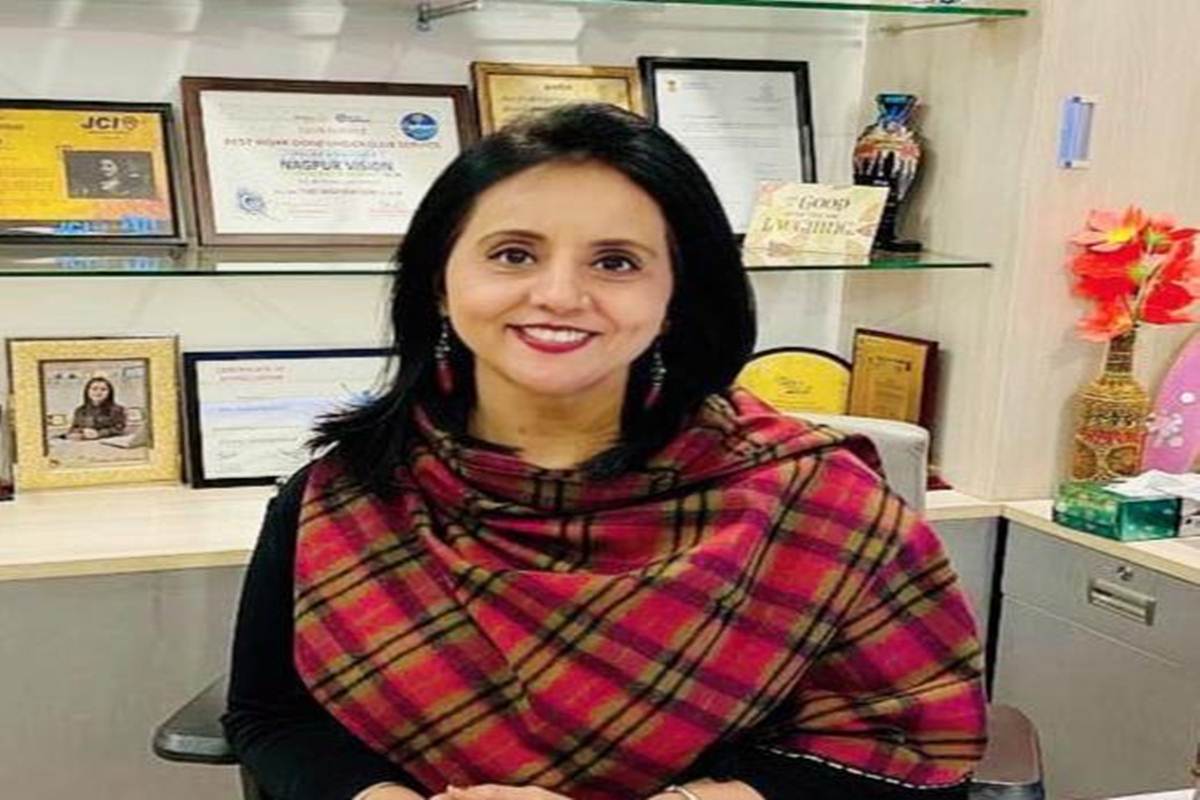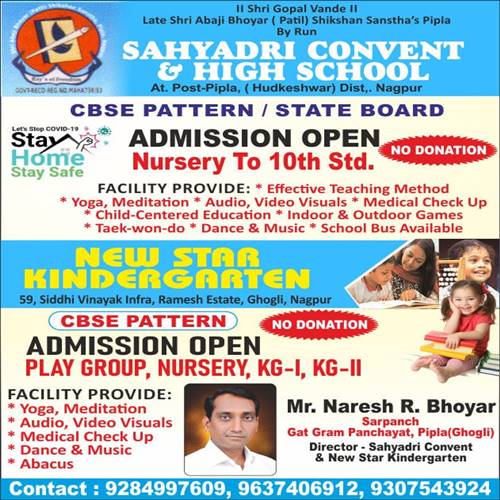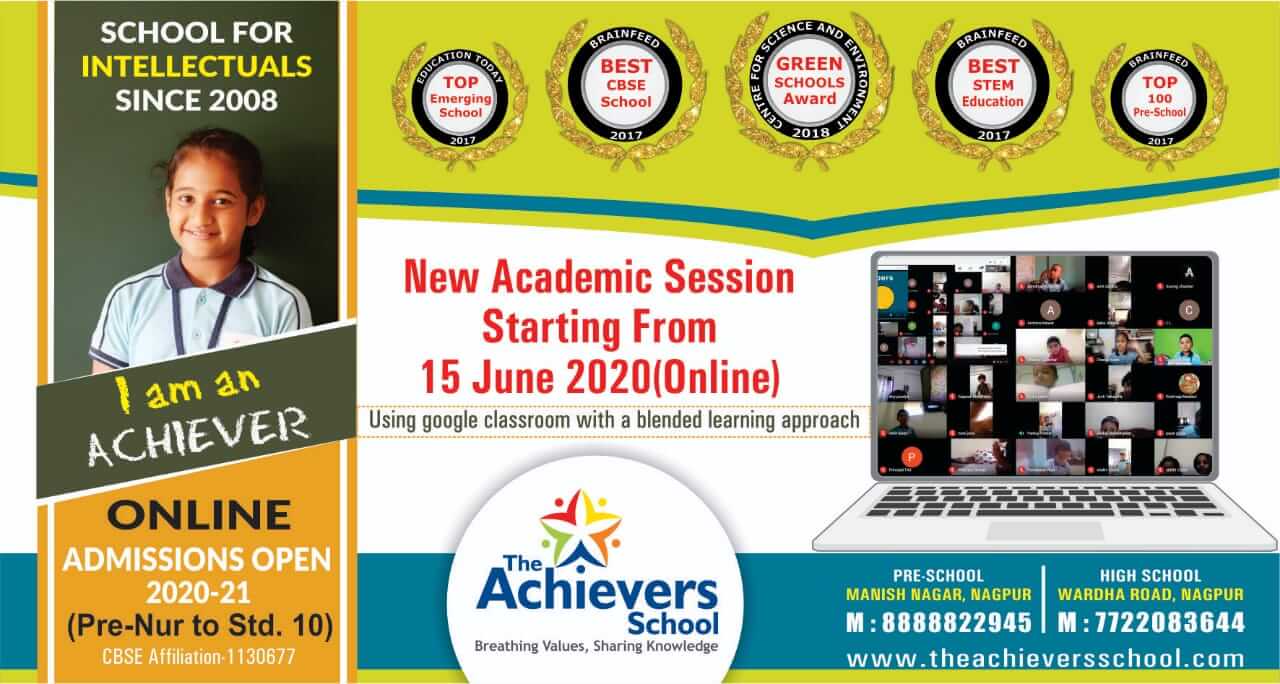COVID -19 has definitely stumped humankind in the most unimaginable manner, and at the same time forced us to reinvent ourselves and our lives, strengthen bonds with family and friends, go back to basics, innovate and most importantly rise to the occasion and showcase human resilience says Anmol Badjatia Principal Jain International School Nagpur. Education has been impacted in an unprecedented manner making the stakeholders in the field of education scramble to cope and find efficient solutions. Till the virus struck many were questioning the efficacy of online /virtual lessons. The main contention being that virtual lessons do not have the human touch which is so necessary when it comes to teaching, especially while teaching young minds in school. The minds that have to be cajoled, prodded, motivated, applauded, heard patiently and so on. Ask any school teacher and out will come a list of millions of tasks she/he has to do while teaching and imparting knowledge.
Education has been impacted in an unprecedented manner making the stakeholders in the field of education scramble to cope and find efficient solutions. Till the virus struck many were questioning the efficacy of online /virtual lessons. The main contention being that virtual lessons do not have the human touch which is so necessary when it comes to teaching, especially while teaching young minds in school. The minds that have to be cajoled, prodded, motivated, applauded, heard patiently and so on. Ask any school teacher and out will come a list of millions of tasks she/he has to do while teaching and imparting knowledge.
But that is where this pandemic of epic proportions has pushed us. Teachers are learning new skills. Skills that helps them to make virtual lessons interesting. Lessons that keep the child engaged as an active learner rather than a passive receptor at the receiving end of a monologue. It is not easy. This type of work requires skill and an evolved thought process. A teacher while preparing such lessons needs to put herself/himself in the shoes of the child and create a learning experience which makes the child come back for more.
This after tackling the first hurdle of learning how to use a particular platform to create the lesson. When a child is in a regular physical classroom there are many things which keep the child attentive and engaged. The movement of the teacher in the class, the gestures, the facial expressions of the teacher, the impromptu talk,… all keep the child interested in the classroom transaction. Compare this to a virtual class where the transaction is reduced to a monologue and instructions. Trying to recreate a semblance of such an environment is a difficult job. But today teachers are doing it. They should actually be called CORONA WARRIORS also.
Virtual classes will at the end of the day do a good job for the academic part of a child’s educational journey. But learning in school is about something more. Value education, general knowledge, physical activities, projects, laboratory work, art and craft activities, and a whole lot of other co curricular activities like debates, elocution, music, dance, etc go towards creating a most meaningful learning experience and environment in school… all at one go. This aspect of education will be sorely missed.

Can a virtual class replace a regular physical school environment? Not completely. A school is a place where not only do children gain knowledge but they learn to socialize, they learn to live in a community, to exercise self control, to negotiate, to communicate effectively. All this will not be possible if learning is done sitting in front of a screen.
There is some light at the end of this tunnel for the teaching community. At the end of this pandemic when we start a new normal, there will be more respect for school teachers and schools. Parents have realized what a difficult task it is to keep a child productively engaged for hours at an end and ensure that they learn much more than only. A job which a school and school teachers do so easily.
Teaching through virtual lessons has posed one more challenge to education. That of the digital divide that exists across all communities. Everyone does not have the access to efficient data plans and internet connectivity. The children coming from digitally savvy backgrounds will be able to gain maximum benefit from virtual lessons and classrooms but the other children will lose tremendously. This scenario will further create a divide in the learning which happens online or through virtual classes. If teaching online is here to stay as a major component of school education this disparity has to be addressed.
This challenge will have to be overcome by the collective efforts of the government and the industry. Creation of virtual lessons is not the only way education has been impacted. Once the pandemic gives us some respite and we have to go back to where we were before the pandemic, the physical environment of a school will have to change. No longer will we have crammed up classrooms. Smaller class sizes will be the norm. Schools which believed in seating 50 -80 children in a small classroom will have to rethink their strategy. They will have to create more infrastructure to ensure physical distancing. Hygiene is the new religion . More so in schools . Schools will have to ensure that sanitizers are available in plenty for all in the school and everyone will have to be sensitized towards the perils of poor hygiene. Keeping tabs on children to ensure they exercise necessary precautions while in school is an uphill task . It is quite possible that schools may have to employ more people just to keep an eye on the children for the entire time spent in school. Temperature screenings will have to be diligently done while all enter or leave the school.
Schools will have to have to rethink sanitization. Sanitizing the premises twice or thrice daily will be the norm. The school transport system will have to be revamped. Capacity of each vehicle will be reduced drastically. Costs will dramatically increase.
What will be done for the break sessions? Generally these periods are those when the children run amok in the school! Do we do away with breaks? Sports and games will take a beating. The physical activities may be reduced to just physical fitness regimes which involve no contact. Each one has his/her space to work out.
Aerobics, Zumba, Yoga, Tai chi and the likes would comprise physical activities. No team games, no contact sports. A complete rethink of sports and games in schools is on the cards.
Examinations will also pose a challenge. We may revert to CCE which allowed a wide variety of evaluation tools both formal and informal , tangible and intangible, to comment on whether a child has achieved expected levels of learning.
All these challenges and changes will lead to truncated school hours. Contact classes may be reduced drastically. Schools may have to give an option to parents to opt for online/virtual classes with the child coming to school only when required for laboratory work or maybe exams. Else schools will probably run classes only on alternate days to reduce contact and travel.
Schools as we know them will no longer exist. At least for the time till we do not find a cure or a vaccine. A silver lining to this scenario is that self regulation amongst children will increase.
Parents involvement in the academic life and learning of their children will increase. The primary three stakeholders in school education : the child, the parents and the teachers, all will bear equal responsibility towards the final outcome of educating the child. It will no longer remain the domain of only the school to educate.
Maybe this pandemic will create a generation of self propelled individuals who own responsibility for their own future. And we as a race will surely overcome this calamity and emerge as a stronger and better community!
👉 Click here to read the latest Gujarat news on TheLiveAhmedabad.com




